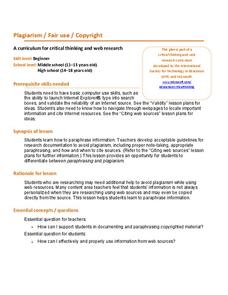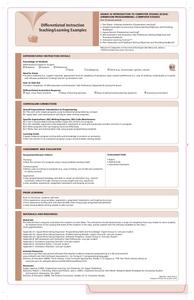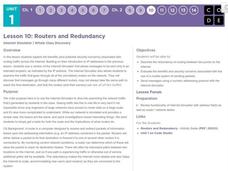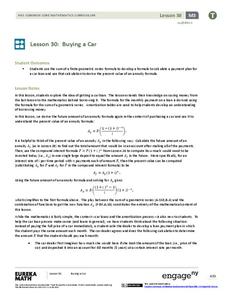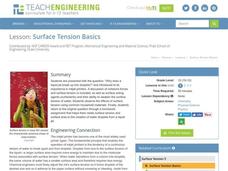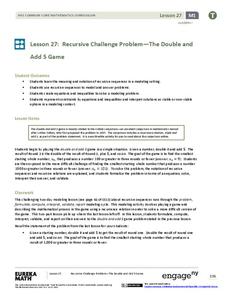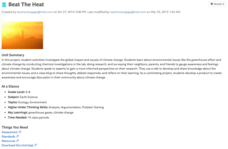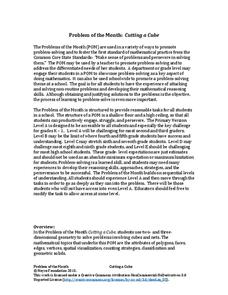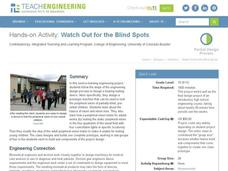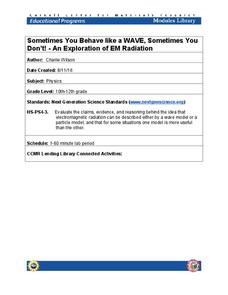K-5 Math Teaching Resources
5x5 Geoboard Paper
Geoboards can take up a lot of space in the classroom; instead use this 5x5 geoboard paper! Six geoboards and lines for writing are included in this multi-use printable and template.
EngageNY
Measuring Variability for Symmetrical Distributions
How do we measure the deviation of data points from the mean? An enriching activity walks your class through the steps to calculate the standard deviation. Guiding questions connect the steps to the context, so the process...
EngageNY
Algebraic Expressions—The Commutative and Associative Properties
Who says math is boring? Turn dry concepts like properties and vocabulary into an interesting lesson! Examine the commutative and associative properties of addition and multiplication using geometric reinforcement. Through collaboration,...
Microsoft
Plagiarism Fair Use Copyright
Nothing makes junior high and high school teachers more frustrated than plagiarism. Instruct young writers about copyright laws and the correct ways to paragraph information without copying the exact words. A set of secondary-level...
Houghton Mifflin Harcourt
Surprise!: English Language Development Lessons (Theme 2)
Surprise! is the theme of this series of ESL lessons. Cover an array of topics such as where we live, different times of day, shapes, the city and the country, what we do for fun, jobs, and games, all while practicing how...
Ontario
Animation Programming—Computer Studies
Introduce high schoolers interested in animation programming to fundamental programming concepts so that they can plan and write simple programs.
Charleston School District
Solving Equations by Combining Like Terms
How do you make these x's get along? Building on the previous lesson in the series, learners solve equations by combining like terms. The video uses objects to help pupils understand the concept.
Charleston School District
Review Unit 5: Equations
It's time for them to show you what they've learned! The review provides a sampling of the different concepts learned throughout the eight-part series. Learners solve equations by combining like terms, applying the distributive property,...
Code.org
Routers and Redundancy
How are messages to the right recipient? Introduce the concept of routing Internet traffic by drawing a comparison to sending a letter. Groups use the Internet Simulator program to send messages to others using the same router...
Teach Engineering
Energy Skate Park
Skate through a simulation on energy with an a activity that uses a computer simulation of a skater to reinforce the concept of conservation of energy. The resource guides pupils through scenarios using the computer simulation to...
Urbana School District
Projectile and Circular Motion, Torque
Introduce your young scholars to the concepts of circular motion, projectile motion, angular speed, simple harmonic motion, torque, center of mass, centripetal force, and Hooke's Law with a 86-slide presentation. The circular motion...
EngageNY
Percent Rate of Change
If mathematicians know the secret to compound interest, why aren't more of them rich? Young mathematicians explore compound interest with exponential functions in the twenty-seventh installment of a 35-part module. They calculate future...
EngageNY
Buying a Car
Future car owners use geometric sums to calculate payments for a car loan in the 31st installment of a 35-part module. These same concepts provide the basis for calculating annuity payments.
Teach Engineering
Surface Tension Basics
Back to the basics (of surface tension). The first installment of a nine-part series teaches young scholars about the basics of surface tension and how it relates to water droplets. They also learn how this concept allows for the...
Novelinks
Walk Two Moons: Story Impressions
Story chains connect literary concepts, reinforce context clues, and even help learners predict what's coming next! Using words from the next chapter of Sharon Creech's Walk Two Moons, middle schoolers craft story chains to...
EngageNY
Recursive Challenge Problem—The Double and Add 5 Game
As a continuation of a previous lesson, this activity builds on the concept of calculating the terms of a sequence. Pupils are challenged to determine the smallest starting term to reach a set number by a set number of rounds. Notation...
University of Nottingham
Modeling Conditional Probabilities: 2
Bring the concept of conditional probability alive by allowing your classes to explore different probability scenarios. Many tasks have multiple solutions that encourage students to continue exploring their problems even after a solution...
EngageNY
End-of-Module Assessment Task: Grade 8 Module 6
Test your knowledge of linear functions and models. The last installment of a 16-part module is an end-of-module assessment task. Pupils solve multi-part problems on bivariate data based on real-world situations to review concepts from...
EngageNY
Writing Equations Using Symbols
Build upon prior equation writing experience to create more complicated equations. Lesson one in a 33-part unit builds upon the class members' sixth and seventh grade experience of writing linear equations. Several examples...
EngageNY
Introduction to Simultaneous Equations
Create an understanding of solving problems that require more than one equation. The lesson introduces the concept of systems of linear equations by using a familiar situation of constant rate problems. Pupils compare the graphs of...
Intel
Beat the Heat
Explore greenhouse effect and climate change through a 15-day unit. Scholars learn about these STEM concepts by researching, conducting surveys, experimenting, and collaborating with experts in the field. They frequently communicate...
Noyce Foundation
Cutting a Cube
Teach the ins and outs of the cube! A series of five K–12 level activities explore the make-up of the cube. The beginning lessons focus on the vocabulary related to the cube. Later lessons explore the possible nets that describe a cube....
Teach Engineering
Watch Out for the Blind Spots
Applying engineering concepts to the field of medicine, pupils design a device to help test peripheral sight. The class learns and follows a specific design process for engineers before separating into groups; each group builds...
Cornell University
Sometimes You Behave Like a WAVE, Sometimes You Don't!
Electromagnetic radiation behaves like both a wave and a particle. Help classes explore this concept through a lab investigation. Young scientists create optical interference patterns on a glass slide using a carbon layer. They analyze...



